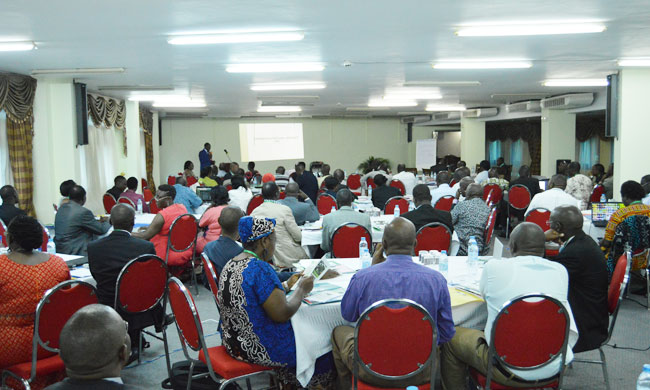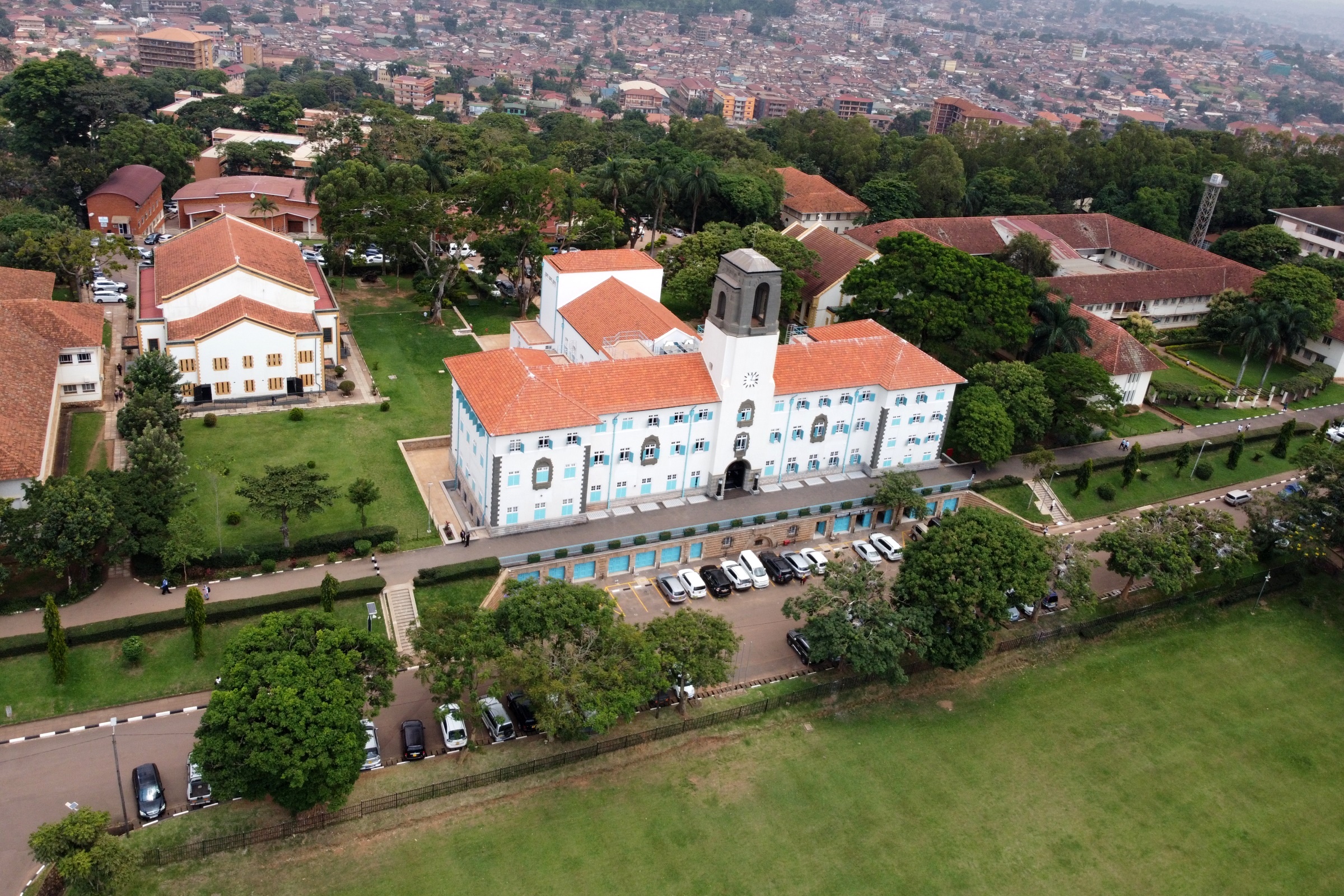Makerere University has embarked on the process that will culminate in the formulation of the next ten year Strategic Plan (2020/21-2029/30). The formulation of the new Mak Strategic Plan (2020/21-2029/30) will take a year-long participatory approach incorporating views of different stakeholders including staff, alumni, students, professional bodies, civil society, as well as the private and public sectors. The current 10 year Mak Strategic Plan is expected to come to an end in 2019.
To kick start the crucial process in the life of this great institution, the Makerere University Management Team held a three-day Strategic Planning Retreat (February 20-22, 2018) bringing on board the Chancellor, Chairperson and Members of Makerere University Council, the Vice Chancellor and Members of the Central Management, College Principals, Deputy Principals, Deans, Heads of Administrative Units, Representatives of the three Staff Associations and Student Support Services, National Council for Higher Education and National Planning Authority.
During the consultative Strategic Planning Retreat officially opened by the Chancellor of Makerere University, Prof. Ezra S. Suruma, consensus was reached regarding the Vision of Makerere University for the next 10 years.
For the next Mak Strategic Plan (2020/21-2029/30), all stakeholders should envisage Makerere University as the Thought-Leader for knowledge creation, society transformation and development. The Strategic choices for the next 10 years will focus on: The Institution (an efficient and effective University with a highly reputable recognized brand), The Graduate (versatile, professionally grounded, ethical and committed to lifelong learning), The Human Resource (An engaged, motivated and highly productive workforce). Makerere University should be a relevant University with development impact.
In a presentation titled, Towards Full Employment by 2025, Chancellor Ezra S. Suruma urged the participants to come up with strategies aimed at addressing the high unemployment levels in the country.
“We should solve this problem of unemployment if the country is to grow and remain stable,” remarked Prof. Suruma.
Highlighting the importance of the Strategic Planning process, the Chancellor said: “I am delighted to be part of the process that helps to be cognizant of the world around us. We need to know the internal and external environment. Universities should provide solutions to societal challenges.”
Welcoming the participants, the Acting Deputy Vice Chancellor (Finance and Administration) who doubles as the Chairperson of the Strategic Planning Committee, Prof. William Bazeyo reiterated that the participants were expected to provide a great contribution to the planning process.
“We are here because we believe in Makerere University. The Makerere University Strategic Plan is drawn by insiders with involvement of stakeholders. We should come together to ensure Makerere University remains a leader,” he said.
Dr. Florence Nakayiwa, the Director of Planning and Development Department provided a detailed account of the performance of the current Mak Strategic Plan. Articulating the performance review, Dr. Nakayiwa presented the achievements in teaching and learning, research and innovations, knowledge transfer partnerships and networking, internationalization, Gender Mainstreaming, Quality Assurance and Enablers such as ICT, Library services, human resource, and finance, among others. She also pointed out areas that needed improvement as we embark on the formulation of the next Mak Strategic Plan. “For instance, the University has not fully transitioned into a research led University. We transformed into a Collegiate University, but we are yet to operationalise some of the aspects of a collegiate institution,” she said.
After her presentation, the Facilitators namely Dr. Patrick Okori and Dr. Paul Kibwika guided the participants into a plenary discussion that further enriched the Performance review of the current strategic plan and extensively focused on documenting the Strengths, Weaknesses, Threats and Opportunities (SWOT analysis).
In a session chaired by Eng. Dr. Charles Wana-Etyem, the Chairperson of Makerere University Council, the Vice Chancellor, Prof. Barnabas Nawangwe shared his vision of unlocking the potential of Makerere University in the next 10 years. The Vice Chancellor strongly believes that each and everyone has a role to play in the transformation of Makerere University. He underscored this statement of fact when tactfully shared the humble beginnings of Makerere University with 14 students and the evolution with a current student population of over 40,000 students. “The University has continued to grow because we have done things differently. We need to benchmark the best practices with the aim of doing things differently.”
The Vice Chancellor revealed his commitment to the process of turning Makerere into a research led University, producing quality graduates, building a University research hospital, revamping the Sports facilities, ensuring ISO certification of Mak, supporting resource mobilization initiatives for a financially stable and sustainable Makerere University, and among others.
Ending his presentation, the Vice Chancellor asked participants to ponder on, “What role can I play in building Makerere University’s brand name?”
The Deputy Chairperson of Makerere University Council, Hon. Irene Ovonji-Odida re-echoed the need for more engagement with stakeholders and a productive Human resources focusing on individual commitment and building the right systems for human resources.
The participants were also requested to write points on: “What can I do to make Makerere University better.” The ideas will be documented by the Strategic Plan Drafting Committee chaired by Dr. Isaac Okullo, the Deputy Principal at the College of Health Sciences, Makerere University.
Envisioning the next 10 years of Makerere University, the participants actively deliberated on the Makerere University external environment, a University of the 2st Century: Benchmarks and Implications for Mak, The role of higher education in meeting the global, regional and national development needs, Improving the teaching and learning environment, Towards a research and innovation led University, Knowledge Transfer and strategic partnerships: University meeting community development needs, Governance and Human Resources: The Collegiate University, Financing and Financial Management.
Other captivating group and plenary presentations focused on: Infrastructure development, facilities and support services, Student Support Services, Internationalisation as a Pathway for Institutional Development, Mainstreaming gender strategic choices for Mak as well as Gender Mainstreaming in the University.
With the participatory approach, the Strategic Planning Retreat (February 20-22, 2018) significantly informed the Strategic planning process and the Strategic Planning Framework. The Strategic Plan Drafting Committee will harmonize the ideas and use the months of March and April 2018 to document the Mak Strategic Planning Framework that will be shared and discussed with the respective Colleges, Administrative and Support Units to guide the development of specific unit Strategic plans.
In the afternoon hours of Thursday 22nd February 2018, the Director of Planning and Development Department-Dr. Florence Nakayiwa, presented the Road map for the formulation of the next Mak Strategic plan as follows:
- Mak Strategic Planning Retreat (Feb 20-22, 2018)
- Documentation of Mak Strategic Planning Framework (March-April 2018)
- Consultation and Formulation of Unit Strategic Plan (May-August 2018)
- Consultation and Drafting of Mak Strategic Plan (Sept-Nov 2018)
- Publication and Launch of Mak Strategic Plan (March 2019)
The Vice Chancellor, Prof. Barnabas Nawangwe who is the Champion thanked the participants for their valuable input.
Closing the Strategic Planning Retreat, Eng. Charles Wana-Etyem said: “We had a productive exchange of ideas. We have only one Makerere University. Let us enhance teamwork for the good of the University and Uganda at large.”
Article by: Ritah Namisango, Mak Public Relations Office
Pictures by: Mak Public Relations Office


 General2 weeks ago
General2 weeks ago
 General1 week ago
General1 week ago
 General3 days ago
General3 days ago
 Natural Sciences4 days ago
Natural Sciences4 days ago
 Health5 days ago
Health5 days ago








